GROUND REPORT BY Anil Varghese
Mysore, 31 January: We had set out from Jaisalmer city on 10 January to see for ourselves the line on the ground that marks out India on the west and to get a glimpse of Pakistan on the other side. As we moved closer and closer to the border, the view from the highway was that of a country that was fading, with fewer and fewer signs of life – fewer people, sparser vegetation. While we were still about 30 kilometres away from the international border, as our car began the descent from a hillock, we found that we were actually in the middle of a desert. As far as we could see on either side of the road, there was only sand. We spied a small village a fair distance off. It was at the bottom of the gentle descent, as the road turned to the right.
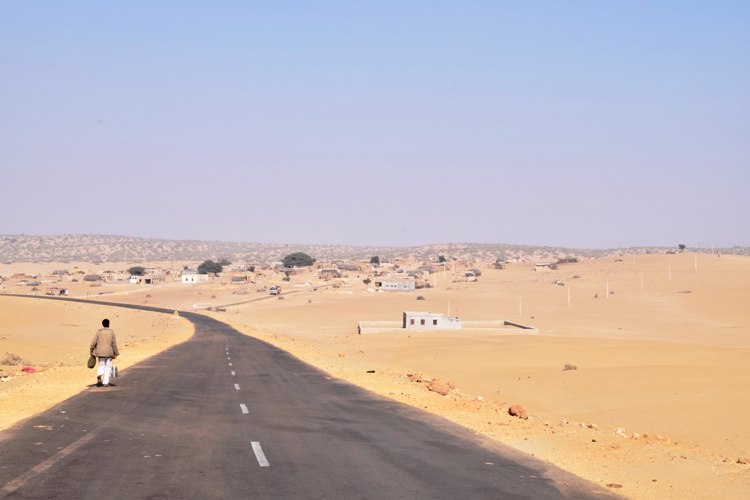
This village, Ranautar (pronounced Raan-au-taar), would serve as our window into the resilient peoples who thrive on the little they have: A patchy phone network (only BSNL), water rationed by tankers, no electricity (although transmission lines pass over their villages).
The houses here were simple box-shaped mud-coated structures with a couple of holes in the walls – instead of windows – just big enough to let the air in (Imagine desert igloos, except for the shape!). It was midday, and the sheep, goats and cows dotted the open spaces of the village. The only thing that could be heard was the constant whirring of the wind, the frequent bleating of the sheep and the goats, and the occasional vehicle racing past on the highway.
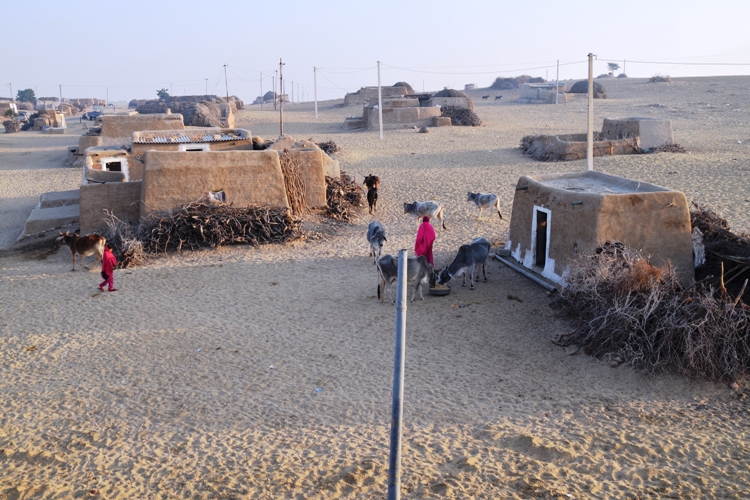
There is only one bus service that links these villages to the nearest city, Jaisalmer; the bus leaves Tanot early in the morning for Jodhpur and returns late evening; many people here have never seen Jaisalmer.
At one of the desert igloos, where we had stopped by to take a closer look at the designs that had been painted on the walls, we met another visitor. Jaganath Singh, who cut a slight darkish figure, was from a neighbouring village called Girduwala. After we had introduced ourselves and had a brief conversation on the daily struggles of the people who live in these parts, he said we could spend the night at his home. “But I have no beds. You will have to sleep on the floor, if that’s okay.”
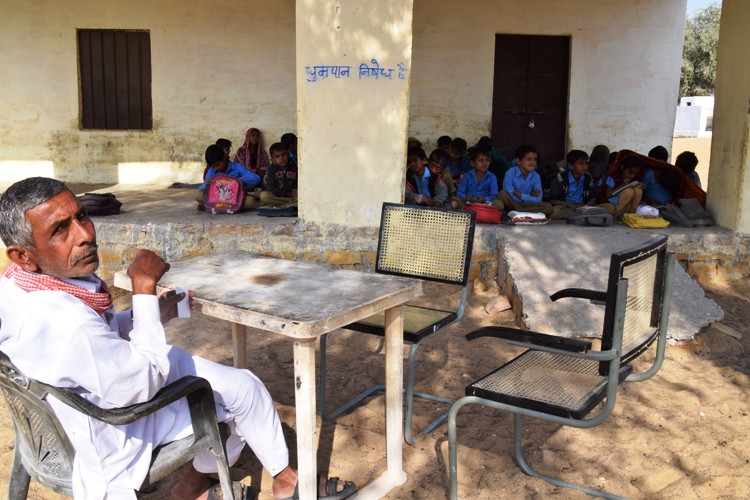
This was a village of the Solankis. They are one of the two Rajput subcastes in the area, the other being Chaudhary. Tanot, a village closer to the border, is all Meghwal, a Scheduled Caste. Here, we ran into a primary school that had just the one teacher for grades one to five. All of them sat together on the veranda of the school building as the teacher, seated in the courtyard, turned his gaze towards students of each grade for a few minutes and addressed them. “Nobody wants to come here. I had applied for a transfer but the government couldn’t find a replacement, so I stayed on.”
Battles on and off the field
The two armed BSF ladies we met at the border outpost too had a similar story of perseverance to tell us. It was after several phone calls that we got the permission to drive through the last 10 or so kilometres to the outpost. Here, the two lady personnel in their twenties who were keeping watch on the fenced border told us that except for the couple of months they get to spend at home, they are at work here almost twenty-four seven, with only six-hour breaks between shifts. They are constantly keeping an eye out for trespassers from the other side of the border. On our side of the border, there was no mobile phone coverage and it was uninhabited scrubland as far as our eyes could see.
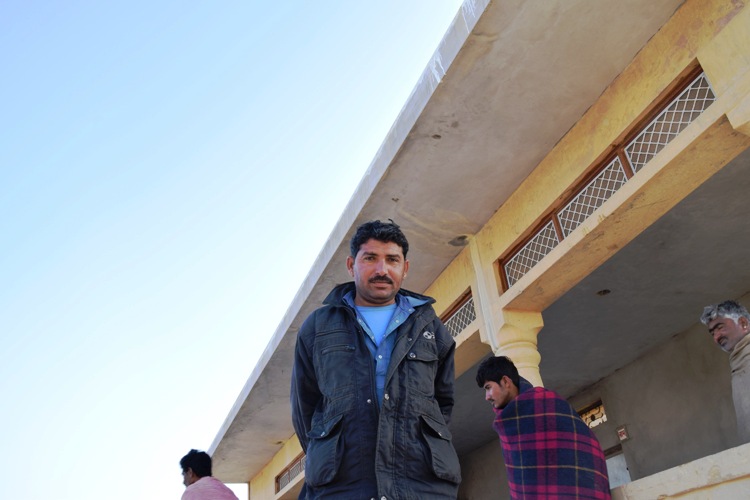
Later that evening, when we returned to Ranautar, it was already dark. Jaganath, who had offered to host us, wasn’t around. Sanowal Singh, a resident of Ranutar, leaning against the car window appeared a little puzzled and apprehensive over why we, still seated inside the car, wanted to meet Jaganath. In his late thirties or early forties, Sanowal was well-built and light-complexioned, and sported a trimmed moustache. It took us some convincing, amid interruptions from a drunken man, before he agreed to drive with us to Jaganath’s village Giridula. After a short drive on the narrow road off the highway, we stopped the car. We had to wade through the sand for about a hundred metres to get to Jagnath’s house. Thankfully, the night was moonlit.
Jaganath had yet to return home after the day’s errand. Padam Singh (Jaganath’s brother), Sanowal and a few others came up with an alternative plan. They suggested that we attend a “party” that was being held somewhere in the area. We agreed, hoping to talk to a lot of people, although we weren’t quite sure what they meant. The venue was further away from the tarred roads. We would have to drive on the sand. They said they would get a tractor to take us there as our ageing Honda CRV might get stuck in the sand. We didn’t want to trouble our generous hosts, and underestimating the dangers of driving a low-floor, two-wheel drive car on sand, we said that wouldn’t be necessary. Hesitatingly, they gave in to our insistence but first they would have to reduce the pressure in the tyres. Once they had let enough air out of the tyres and were satisfied, we set out for this unknown destination.
Stranded in the desert
There was no road out there, just the crisscrossing tyre marks. We had an elderly navigator though. Whenever he asked us to turn, we turned. Pramod Ranjan, who had taken over at the wheel from our driver Ravinder Ravidas, was completely at his mercy. “Faster, faster”, the hosts seated in the car, egged him on. “If you slow down, you’ll get stuck,” they said. We didn’t quite believe them until their fears came true. As we were negotiating a gentle climb, the car stopped moving. The engine roared, the wheels turned and turned, but the car didn’t budge. There was nothing we could do. We had to get help.
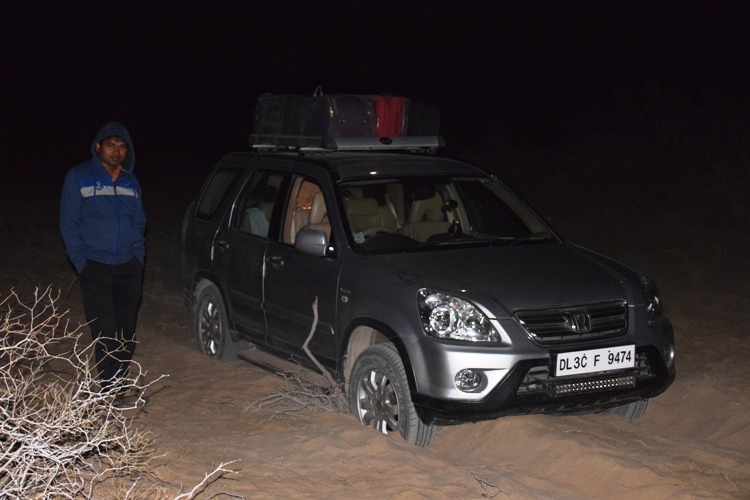
None of our phones was working. One of us would have to climb a hillock to find a patch of BSNL coverage. We needed the tractor after all. After a few attempts, we did get through to the tractor owner and after waiting for about an hour, the tractor did come to our rescue. When the tractor started moving, with Sanowal at the wheel, there were about ten of us on board. Every inch of space had been taken up. The biting chill had made our hands and feet numb but we had to hold tight to any part of the tractor that we was within our reach as it tilted this way and that way. Many a time, it felt as if the tractor would topple as it wound its way around a scrub. What seemed like a never-ending ride lasted more than 30 minutes. We were relieved when it finally ended.
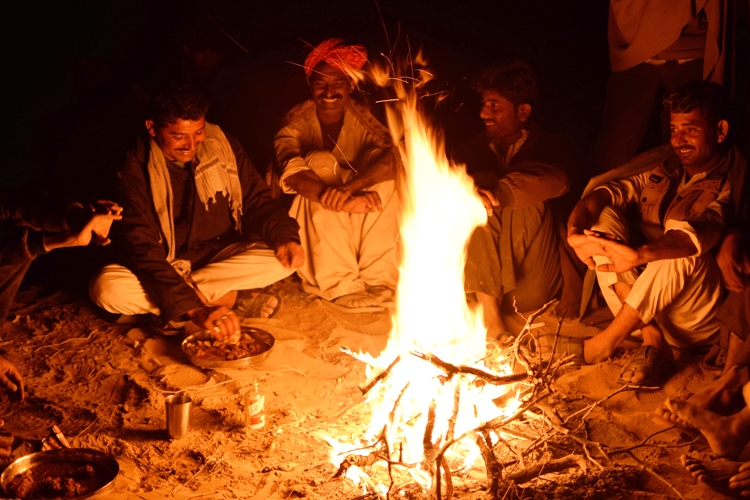
Party time
The “party venue” was a clearing in the middle of nowhere. Men from Ranautar and neighbouring villages had set up base to graze their sheep and goats. They are here 24 hours a day, seven days a week. They were needed here now more than ever as the goats were giving birth to their young ones. Foxes were on the prowl and the young ones were easy prey. While we were enjoying the feast of mutton curry and rota (a massive lump of dough flattened and baked on charcoal), we heard the desperate bleat of a goat kid. A fox was taking it away, we were told. The kids were kept in little cages made of straws in an adjoining clearing. Not all of their mothers had enough milk to breastfeed them. The shepherd’s job was to ensure the all the kids shared the milk that was available among the flock. Each of the men had flock sizes that ranged from a mere 50 to the hundreds and even a thousand.
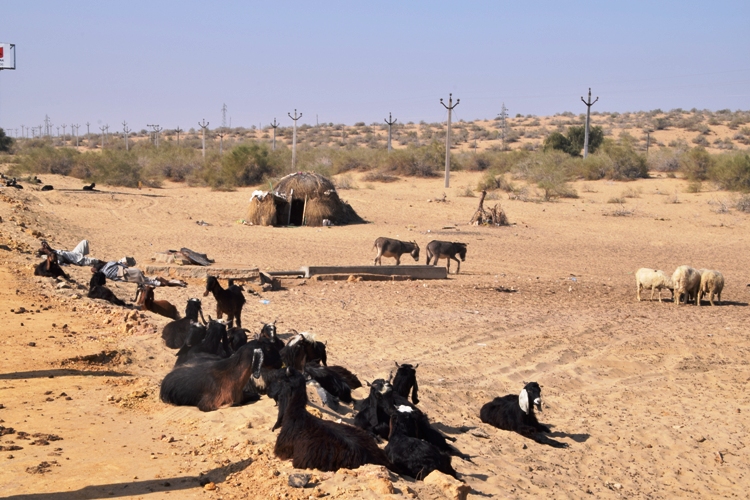
Sanowal Singh told us that demonetization had crippled animal rearers like him. He alone lost 30 cows because he didn’t have enough cash to buy feed. Padam Singh, Jagnath Singh’s brother, saw 30 of his goats die of hunger. His village Girduwala lost 500 cows, sheep and goats. When an animal doesn’t get enough to eat, it almost inevitably miscarries. So, the shepherds are still counting their losses. Sanowal rued the lack of government insurance programmes to help cope with these losses like the farmers have for crop losses.
Before the fence went up on the border in the mid-Eighties, they had something else to worry about: raiders from Pakistan who would steal their cattle. That is thankfully in the past.
We must have spent a couple of hours talking to them. It was time for us to go back to Ranautar to catch some sleep. One of the men from Ranautar had come in his SUV (a Mahindra Scorpio), so we got a ride back with him along with the others from the village. On the way, we stopped to see if we could get our car to move. This time we had the numbers but it still took us a lot of pushing from the front and the side to free the car from the sand. Soon, we were back at Ranautar, where we spent our night in an unfinished house. The owner of this house had broken with tradition and built it in the Jaisalmer style – perhaps this along with the two Scorpios we spotted in the village were an indication that despite how challenging animal-rearing was in these conditions, it was profitable. The Indian Border Roads Organization was carrying out repair and widening works on the highway but it had employed migrants from Jharkhand. The residents of these hadn’t felt the need to find employment in these work sites. We found small shanty settlements along the highway where these migrant workers and their families were temporarily putting up.

Casteism rears its head
The next day, we were woken up early in the morning by the loud cry of one of the elders of the village. We would learn later that he was letting everyone know that the village had guests and a meeting had been convened. When we stepped out of the house, we saw some seniors in colourful turbans huddled around a fire. Sanowal Singh didn’t tell us what transpired at the meeting but he didn’t exude the enthusiasm of the previous night. Something wasn’t right. Either the elders disapproved of his hosting us without their permission or he had sniffed our “lower castes” out the previous night. Our driver Ravinder Ravidas might have let slip his caste identity at the “party” and they might not have taken kindly to us eating from the same plate.
We packed our bags, said our goodbyes, got into our car and headed back to Jaisalmer. So much for Rajasthani Rajput hospitality!

About 30 kilometres away, at Ramgarh, the town closest to Ranautar, a local government healthcare worker hitched a ride with us. He belonged to the Meghwal (an SC) community. When we got talking, he explained to us some of the casteist practices in the area. For instance, at an upper-caste wedding, he and people of his caste – if at all they are invited – would have to dine in a separate tent. “The OBCs do not want to discriminate against us but the upper castes will mistreat them if they don’t,” he said.
The Solankis of Ranautar didn’t even know the OBCs existed. For them, there were the Rajputs and the Dalits, and they only have marital relations with other Rajputs. Ranautar’s isolation was the reason for both the rough life of its residents and them being prosperous, with plenty of land for their livestock to graze, and, ironically, cocooned. This made us realize that when such an upper-caste village escapes the tight leash of its elders or when a better phone network coverage brings it closer to the rest of the world, it stands to lose some things while making other gains. Among the losses would be the ill-gotten social status it currently enjoys in the immediate society.
Forward Press also publishes books on Bahujan issues. Forward Press Books sheds light on the widespread problems as well as the finer aspects of the Bahujan (Dalit, OBC, Adivasi, Nomadic, Pasmanda) community’s literature, culture, society and culture. Contact us for a list of FP Books’ titles and to order. Mobile: +919968527911, Email: info@forwardmagazine.in)





